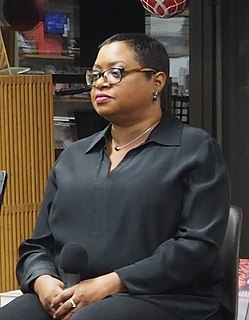A Quote by Maggie Stiefvater
I'm an equation that only she solves, these X's and Y's by other names called. My way of dividing is desperately flawed as I multiply the days without her" - Page 165
Related Quotes
In a way, her strangeness, her naiveté, her craving for the other half of her equation was the consequence of an idle imagination. Had she paints, or clay, or knew the discipline of the dance, or strings, had she anything to engage her tremendous curiosity and her gift for metaphor, she might have exchanged the restlessness and preoccupation with whim for an activity that provided her with all she yearned for. And like an artist with no art form, she became dangerous.
She still had her bad days, no question, when the black dog of depression sniffed her out and settled its crushing weight on her chest and breathed its pungent dog breath in her face. On those days she called in sick to the IT shop where, most days, she untangled tangled networks for a song. On those days she pulled down the shades and ran dark for twelve or twenty-four or seventy-two hours, however long it took for the black dog to go on home to its dark master.
She bent her finger and then straightened it. The mystery was in the instant before it moved, the dividing moment between not moving and moving, when her intention took effect. It was like a wave breaking. If she could only find herself at the crest, she thought, she might find the secret of herself, that part of her that was really in charge. She brought her forefinger closer to her face and stared at it, urging it to move. It remained still because she was pretending... . And when she did crook it finally, the action seemed to start in the finger itself, not in some part of her mind.
You cannot hammer a girl into anything. She grows as a flower does, she will wither without sun; she will decay in her sheath as a narcissus will if you do not give her air enough; she might fall and defile her head in dust if you leave her without help at some moments in her life; but you cannot fetter her; she must take her own fair form and way if she take any.
I found her lying on her stomach, her hind legs stretched out straight, and her front feet folded back under her chest. She had laid her head on his grave. I saw the trail where she had dragged herself through the leaves. The way she lay there, I thought she was alive. I called her name. She made no movement. With the last ounce of strength in her body, she had dragged herself to the grave of Old Dan.
This is how space begins, with words only, signs traced on the blank page. To describe space: to name it, to trace it, like those portolano-makers who saturated the coastlines with the names of harbours, the names of capes, the names of inlets, until in the end the land was only separated from the sea by a continuous ribbon of text. Is the aleph, that place in Borges from which the entire world is visible simultaneously, anything other than an alphabet?
She was beautiful, but not like those girls in the magazines. She was beautiful, for the way she thought. She was beautiful, for the sparkle in her eyes when she talked about something she loved. She was beautiful, for her ability to make other people smile, even if she was sad. No, she wasn't beautiful for something as temporary as her looks. She was beautiful, deep down to her soul. She is beautiful.
She smiled, pulling the photo a little closer, and I wondered if I should ask her, too, the question for my project, get her definition. But as she ran a finger slowly across the faces, identifying each one, it occurred to me that maybe this was her answer. All those names, strung together like beads on a chain. Coming together, splitting apart, but still and always, a family. (page 289) ~Ruby
She sits in her usual ample armchair, with piles of books and unopened magazines around her. She sips cautiously from the mug of weak herb tea which is now her substitute for coffee. At one time she thought that she could not live without coffee, but it turned out that it is really the warm large mug she wants in her hands, that is the aid to thought or whatever it is she practices through the procession of hours, or of days.
As though she had entered a fable, as though she were no more than words crawling along a dry page, or as though she were becoming that page itself, that surface on which her story would be written and across which there blew a hot and merciless wind, turning her body to papyrus, her skin to parchment, her soul to paper.
There are no words for how much I will miss her, but I try to kiss her so that she'll know. I try to kiss her to tell her the whole story of my love, the way I dreamed of her when she was dead, the way that every other girl seemed like a mirror that showed me her face. The way my skin ached for her. The way that kissing her made me feel like I was drowning and like I was being saved all at the same time. I hope she can taste all that, bittersweet, on my tongue.
The girl was lighter without her heart. She danced barefoot on the hot roads, and her feet were not cut by the glass or stones that studded her way. She spoke to the dead whenever they visited her. She tried to be kind, but they realised that they no longer had anything in common with her, and she realised it, too. So they went their separate ways.
The problem with Antigone is that she stood up to the despot Creon, but in such a way that she ended up dying. So she bought her defiance with her death. The real question I ended up asking was, "What would it mean for Antigone to have stood up to Creon and lived?" And the only way she could have lived is if she had had a serious social movement with her. If she arrived with a social movement to take down the despot, maybe it would have taken 18 days only, like in Egypt. It's really important to be able to re-situate one's rage and destitution in the context of a social movement.
When I looked at [Fannie Lou] Hamer and that speech it seemed to me that she had to be the bravest woman ever, to come before that body and to assert her rights, when she knew that she was going lose that battle. But she did it anyway, because she knew she was speaking not just for herself and for that day, but for me, and for all the other young women who were coming behind her. She didn't know our names, but she was working for us. I find that incredibly empowering.



































